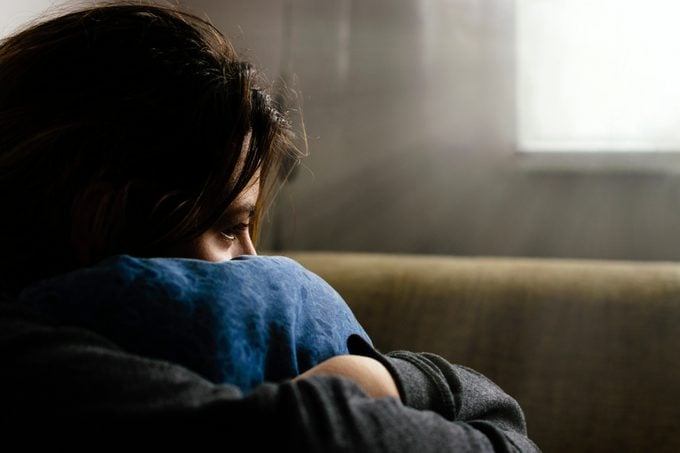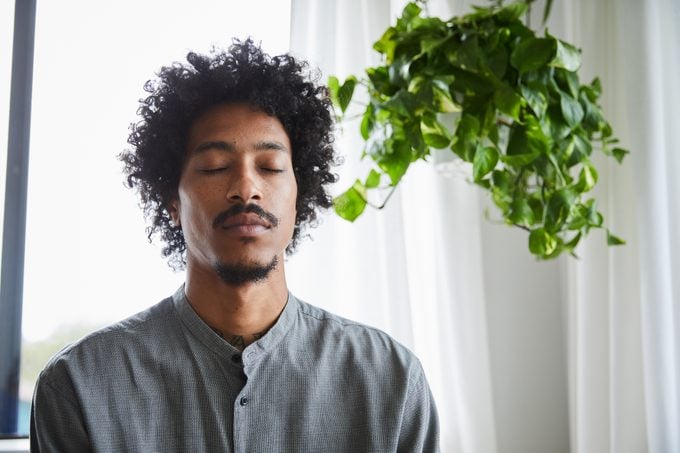Low-Grade Depression Risk During Coronavirus—How to Protect Yourself
Updated: Mar. 08, 2022
Protect your mental health and learn about dysthymia (low-grade depression) and why it's a risk during Covid-19.
Michelle Obama continues to be a source of inspiration, including when it comes to destigmatizing mental health issues. Last month on “The Michelle Obama Podcast,” the former First Lady shared that she has “low-grade depression.” It’s obvious that 2020 has been an anxious year due to Covid-19, the social justice movement, and the upcoming U.S. presidential election. And if you’re dealing with symptoms of depression and anxiety, everything can feel tougher to cope with. As Obama talked about her mental health challenges, many people sat up and said “that’s me, too.”
So, what exactly is low-grade depression, a term often used alongside dysthymia, and how it differs from depression? Mental health experts explain what you need to know.
Low-grade depression symptoms
In the midst of the Covid-19 pandemic, it can be difficult to know if your mental and emotional state is normal or abnormal. After all, it’s okay to feel overwhelmed right now with the uncertainties of the novel coronavirus. Knowing the difference between feeling blue and feeling depressed can help you determine if you need professional help.
Sanam Hafeez, a neuropsychologist in New York City and faculty member at Columbia University, says “low-grade depression is a mild, chronic depression.” She also cautions that mild doesn’t mean “no big deal.” Hafeez says that a chronic, mild depression may leave you constantly feeling sad, hopeless, sluggish, irritable, and give you trouble focusing. “Many people will begin to feel prolonged periods of poor productivity as well,” she adds. Your depression can also trigger insomnia. (Here’s how to cope with depression and insomnia.)
Depression’s on the rise
It’s probably no surprise that six months spent dealing with widespread sickness and death, quarantine orders, time away from loved ones and friends, and—if you’re a parent—pressure to work without childcare and/or during virtual learning, has taken a toll on mental health. In fact, a study released this month in JAMA Network Open found people were three times as likely to develop depression symptoms during Covid-19 compared to pre-pandemic. “Think about the abrupt manner in which life changed earlier in 2020,” says Hafeez. “It can be reasonable to suspect low-grade depression as life goals become stalled, families around the country experience losses of loved ones or financial stability, along with regular [every day] stresses,” she adds.

Low-grade depression versus major depressive disorder
Low-grade depression differs from major depressive disorder, which is characterized by similar symptoms like a sense of hopelessness and worthlessness, irritability, and a persistent sad or empty mood. These symptoms last all day or most of the day and are usually present for around for at least two weeks, according to the National Institute of Mental Health. When it comes to low-grade depression, you’ll experience similar feelings. “They may not rise to the level of major depression symptoms,” but it’s still important to acknowledge that they’re happening, says Hafeez.
Low-grade depression is often used interchangeably with dysthymia, which is actually persistent depressive disorder (PDD), according to the National Institute of Mental Health. In previous versions of the Diagnostic and Statistical Manual of Mental Disorders, PDD used to be called dysthymia. To receive an official dysthymia diagnosis, this mood disorder needs to have been present for two years.
Low-grade depression is a pre-pandemic problem
Consider, also, that your symptoms may have been present before, but you just didn’t stop to really evaluate them. “The pandemic may have started just over six months ago, but more mild symptoms may have been felt before. The Covid-19 pandemic may have just made you hyperaware of these feelings in the presence of social isolation and all the other stressful circumstances brought about by Covid-19,” says Hafeez. Regardless of the label, your mental health matters. Make sure you know how to fully prepare for a coronavirus winter.
When to seek professional health
Here’s an important question to ask yourself: How are really you doing? “If depressive symptoms are causing you to feel overwhelmed, unsafe, or impairing your ability to function on a daily basis, you should seek psychiatric help,” says Samar McCutcheon, MD, psychiatrist in the department of psychiatry and behavioral health at The Ohio State University Wexner Medical Center. Not sure because the feelings are new? Or, it seems so normal to feel like you’re drowning in stress (because so many people are there, too)? Dr. McCutcheon recommends talking about what you’re going through with your general practitioner “who can help differentiate between things like low-grade depression and major depressive disorder.”
If you’re anxious about seeing a mental health expert in person, you can also opt for telehealth therapy. With Covid-19 still present, therapists and other health providers now offer their services online via video chat appointments.

Make self-care a priority
Don’t confuse “low-grade” with “not important” or something you have to push through on your own. You deserve to feel better, especially if you’re struggling to get through the day-to-day. If your symptoms are mild and come and go, your doctor may recommend lifestyle changes, says Dr. McCutcheon. That includes considering self-care a priority, which means spending time (even short bouts) doing things that help you find balance and peace, such as performing a few simple breathing exercises throughout the day, listening to music, or calling a friend or taking a physically-distanced walk together.
Maintain a daily routine
Also important is centering your day around structure, which can help anchor you and provide purpose and flow to your day. “I recommend that everyone, regardless of depressive symptoms, maintain a daily routine with scheduled activities and a set bed and wake-up time,” says Dr. McCutcheon. Avoid self-medicating with alcohol or recreational drugs, as these are unhealthy coping mechanisms that can worsen your mood.
Try different types of therapy
Lastly, therapy, such as cognitive behavioral therapy or interpersonal therapy (which looks at relationships with the people in your life), are additional tools that can help you work through depression, adds Hafeez. “This is a time for people to understand that self-care and healthful enjoyment are also important aspects of life, and our mental health requires that we invest in ourselves,” she says.
If you or someone you know has had thoughts of self-harm or suicide, contact the National Suicide Prevention Lifeline (1-800-273-8255), which provides 24/7, free, confidential support for people in distress.















